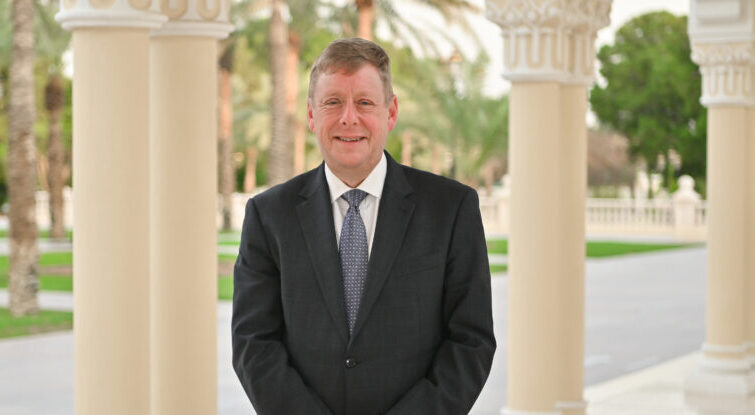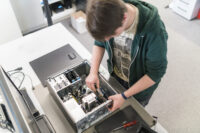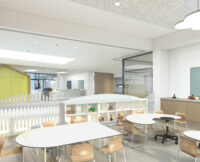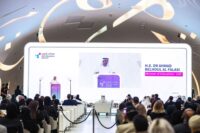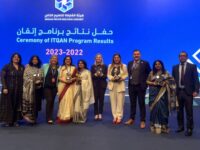Dr. Tod A. Laursen is the Chancellor of American University of Sharjah (AUS). Prior to the current role, he served for nearly 11 years as the head of Khalifa University in Abu Dhabi, SUNY Polytechnic Institute in New York and Wigwe University in Nigeria, along with an additional two years as the Chief Academic Officer (Provost) of the State University of New York.
With a PhD and an MS in Mechanical Engineering from Stanford University and a BS in the same subject from Oregon State University, Dr. Laursen specialises in computational mechanics, a subfield of engineering mechanics concerned with the development of new computational algorithms and tools used by engineers to analyse mechanical and structural systems. He has published more than 100 refereed articles, book chapters and abstracts, and has authored or co-edited two books.
Dr. Laursen is a Fellow of the American Society of Mechanical Engineers, the International Association of Computational Mechanics and the United States Association for Computational Mechanics and holds memberships in the American Society for Engineering Education and Tau Beta Pi. He served as an at-large member of the Executive Committee for the United States Association for Computational Mechanics between 2007 and 2010 and as a member of the Executive Council of the International Association for Computational Mechanics until 2020. Additionally, he has served on the scientific advisory committees of several important national and international congresses in computational mechanics.
In a conversation with Education Middle East, Dr. Laursen shares his vision for AUS and his views on the state of research funding for universities in the UAE, rapid integration of digital advancements into education, the future of engineering education in the country and more.
Congratulations on your recent appointment as the Chancellor of the American University of Sharjah. What is your vision for the university in the long term?
Thank you. As I enter AUS as its seventh chancellor, I am particularly struck by the very strong reputation our institution, and our graduates, have established in the UAE, regionally and internationally. I led Khalifa University as President between 2010 and 2018, and knew and admired AUS’s accomplishments from a very early stage. In the five years that I was away from the UAE, the reputation of AUS has done nothing but strengthen. In this next phase, AUS will be seeking to grow our reputational strength even further, through increased research intensity and thoughtful programmatic development, particularly where our graduate offerings are concerned. The quality of the student experience will continue to be a focus here as will the liberal education offerings that form the core of our undergraduate programmes in all fields.
You have extensive experience in research and development with the roles you’ve held at various universities globally. How do you plan to use this experience to foster growth at American University of Sharjah?
Although there are commonalities across continents in terms of needed research components, the circumstances differ somewhat in the institutions I’ve worked in, ranking from elite private institutions in the US to publicly funded American institutions to the two universities I’ve led in the UAE. So the ability on the part of an administration and faculty to adapt to the circumstances available to them for research is important—coming from the United States and expecting approaches to research support to just translate, without modification, is probably not a winning strategy.
My experience has been that if the institutional ethos of an institution is open-minded about the forms that external partnership can take and supports its faculty in a variety of approaches to support their scholarship, the chances of success in doing high-impact research greatly improve. Simply put, we will do all we can to be a reliable and solid partner for our academic, governmental and industrial stakeholders. And we will need to innovate in identifying the resources necessary to support our research enterprise.
What are the sources of research funding for universities in the UAE? How does it compare with other advanced economies?
In the past 10 to 15 years there have been increasing efforts by both Emirate-level governments as well as the federal government to provide research support in the forms of graduate student fellowships and grants, traditional research grants, support grants for partnerships and the like.
In my home field of engineering, I can also cite examples where industry and semi-governmental entities have partnered effectively with our top universities in the UAE to support important initiatives in such areas as semiconductor development, robotics, aerospace, biotechnology, sustainability, renewable energy and so on. The results of these investments show to some extent the increased reputation of many of our UAE institutions for their research contributions.
We are not yet to the level of research investment in much of North America, Europe, or Asia, and that is probably the next step to be taken for all of us in creating the innovation ecosystem we all aspire to.
What are your views on the rapid integration of digital advancements into the education system? To what extent has American University of Sharjah integrated technology into its academic programmes?
There are many opportunities for us to digitally transform the student experience, not only in the way students are taught but also in the way we advise them, provide them with services and optimise our administrative functions. People talk a lot about artificial intelligence in this context but, of course, such approaches require that the data on which such decision-making tools are based is in good shape also. We are placing a lot of emphasis on support of such ideas as we modernise our IT infrastructure, invest in our next generation labs and update our learning management and ERP systems.
In the classroom, we’ve made several recent adaptations to our curricula so that future graduates are assured of being armed with next generation digital skills. Our new engineering curriculum (CEN 2.0) provides all engineers with a meaningful introduction to data science and artificial intelligence, for example.
How important is student and staff well-being at American University of Sharjah, and how do you plan to enhance it?
Well-being is increasingly a focus for all of us in higher education, and AUS is no exception. On both the staff and student side, numerous wellness programmes run continuously throughout the school year. Increasingly, our focus will be on proactive approaches to identifying student needs in this area. As a largely residential campus, we think an integrated approach between residential life staff, counseling staff, and advising and mentoring personnel is key to making sure this system works well.
Student preparedness for the workplace is crucial these days. At American University of Sharjah how do you ensure that students possess the skills and knowledge they need for the job market?
This is one of the areas of which we are most proud – our reputation amongst employers has been at the very top in the UAE for several years running. Although there are many reasons for this, an important one is the level of dedication we have to quality internship experiences for our students, which allows our stakeholders to interact with AUS students in real time as they develop their professional acumen. It helps the student identify their passions and the areas where they need to develop, and the hosting entities provide us with vital feedback for our programmes.
As a professor of mechanical engineering, how do you see the future of engineering education in the UAE? What are the opportunities and challenges?
The future of engineering in the UAE is very bright. Simply put, the stature of engineering as a field is very high in the UAE, meaning that students and their families value an engineering credential with the same level of esteem as a legal or medical education. This is not always true in other societies. So as engineering educators here, we truly have the chance to work with the ‘best and the brightest’, as often as not.
And the fact that this country is so aspirational in a technical sense is hugely motivating as well – look at the space programme, the innovations in telecoms, the push for renewable energy solutions – there is no shortage of truly motivating fields for young technologists to enter after university. The challenge, in my view, is that we as educators don’t take this strong state of affairs for granted – we need to continue to innovate in our educational offerings, and it is important also for every engineer to understand the societal context for their technical work. This is one of the reasons we are so proud of the strong general education core we provide our students at AUS – they must not only be strong technologists, but they must be leaders and thoughtful citizens as well.
What, according to you, are some of the most in-demand courses in the region and why? Has American University of Sharjah introduced any new courses recently?
Courses in engineering, business and international relations continue to be very popular at AUS and at our competitors. In many cases this popularity stems from the clear career paths students see available to them after finishing.
We continue to see huge demand for our architecture programme as well, for much the same reason as well as the stellar reputation it has built. But I am happy also to see increasing interest in fields that maybe didn’t have the same level of enrollment about ten years ago. Psychology is one such major for us, which is comparatively new. For many years it was a successful minor here, but interest grew to the point where a major made sense. When one thinks of the increased prominence of cognitive science and societal awareness of mental health issues, I think this is a very positive development.
Teachers form the foundation of any institution. Can you share some tips on how universities can support them to create an environment for innovation and collaboration.
I couldn’t agree more – the heart of any institution is its faculty. I think the most important thing I try to keep in mind in leading our institution is this: what attributes will best contribute to the type of institution I would want to work in as a faculty member? Some of these come in the way of needed supports – library services, educational technology, adequate facilities and support personnel, research support offices, and the like.
However, much of faculty happiness rests also with feeling that they are part of the decision-making process of the institution, and can actively contribute to the goal-setting and planning that institutions must undertake. This inclusivity is also important for staff happiness by the way. So, we will continue to spend a lot of time working on the environment in which our work gets done, making sure that it remains supportive and innovative.

